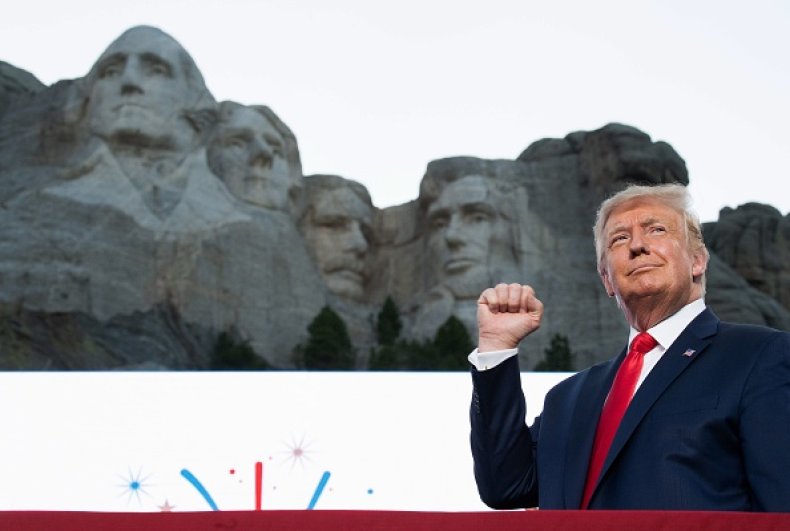Trump's Mount Rushmore Independence Day Celebration Cost Almost $4 Million, Report Finds
A new report shows that last year's Independence Day celebration hosted by former President Donald Trump at Mount Rushmore cost almost $4 million.
The report, released by the Government Accountability Office (GAO) on Monday, found that the total costs for the 2020 Fourth of July events held in Washington, D.C., and at South Dakota's Mount Rushmore totaled $14,573,608.
The breakdown of costs shows that the event held at Mount Rushmore cost the most, a whopping $3.92 million. The Capitol Fourth concert in D.C. was the second most expensive event, costing $3.89 million. Other event costs ranged from $1.6 million to $2.6 million.
Trump's festivities drew controversy last summer when he traveled to Mount Rushmore for a flashy fireworks display and military flyover as the nation was reckoning with the symbolism behind such monuments.
In the wake of the George Floyd protests, statues across the nation that commemorated historical figures were criticized by those who saw them as symbols of racism and oppression rather than freedom.
Some argued that Mount Rushmore is an insulting reminder of how the land in South Dakota was taken from Native Americans, while others pointed out that the landmark's sculptor, Gutzon Borglum, was a member of the Ku Klux Klan. In addition, Presidents George Washington and Thomas Jefferson, two of the faces carved into Mount Rushmore, were slave owners.
Trump used the July Fourth celebration as an opportunity to condemn those who called for the removal of monuments throughout the country. "I am here as your president to proclaim before the country, and before the world, this monument will never be desecrated," he said in a speech.
"These heroes will never be defaced. Their legacy will never ever be destroyed, their achievements will never be forgotten, and Mount Rushmore will stand forever. As an eternal tribute to our forefathers and to our freedom," he said.

The GAO, which audits the federal government, said it was asked to review both the costs of the events and the safety measures taken because of the coronavirus pandemic.
"During the 2020 Fourth of July events, Centers for Disease Control and
Prevention–issued federal guidelines as well as state and local guidelines that
South Dakota and Washington, D.C., issued were in effect," the report reads.
The report found that while numerous protective measures were taken in D.C. in accordance with both federal and state guidelines, the events at the national memorial followed different rules under South Dakota law.
"During the event, [National Park Service] provided [personal protective equipment] to event staff, developed signage that was distributed throughout the event, and encouraged attendees to remain socially distanced and wear masks," the GAO said. "However, social distancing and mask wearing were not requirements."
South Dakota had relatively loose COVID-19 restrictions during the pandemic, under the direction of Governor Kristi Noem, who did not implement a statewide mask mandate and encouraged large gatherings without social distancing.
Ahead of the Independence Day events, Noem said those with health concerns could stay home. She also said the state would offer free face masks to attendees who wanted one but there would not be social distancing at the event.
Compared with previous celebrations, last year's July Fourth events broke the record for the highest cost. Before 2019, the annual event cost roughly $6.5 million each year. In 2019, the federal government spent $13 million on Independence Day festivities.
This year, the National Park Service refused to let Noem hold a July 4 fireworks display at Mount Rushmore, saying it could risk the health and safety of the park and everyone in it. The NPS also mentioned objections from local Native American tribes. Noem has said she would appeal a federal court ruling siding with the NPS.

